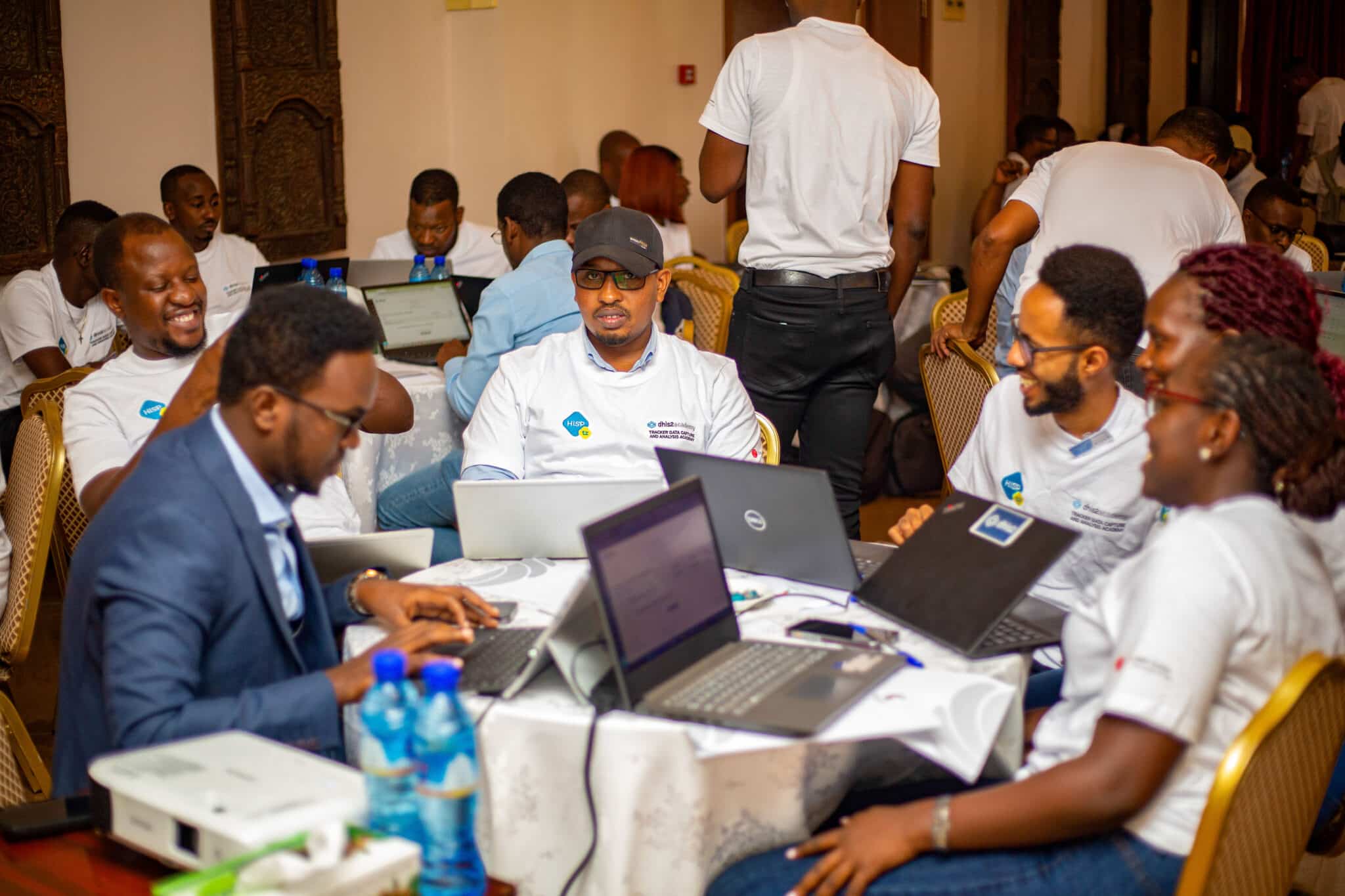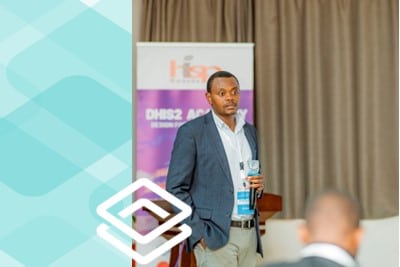Esta página ha sido traducida de manera automática y puede contener errores

Tracker Configuration Fundamentals
Are you a DHIS2 tracker implementer looking to enhance your skills in tracker configuration? Join us for the Tracker Configuration Academy!
Formato
In PersonUbicación
Lilongwe, MalawiFecha de inicio
11 Nov 2024Fecha final
15 Nov 2024Enlaces directos al contenido de la página
Academy Overview

Learning Outcomes
By successfully completing this Academy you will:
- Review best practices from live Tracker use cases
- Learn about the DHIS2 Tracker data model and key Tracker terminology
- Learn to design and configure Tracker programs, including program rules and indicators
- Understand Tracker data protection and security features
Read more about course format and learning outcomes on our Course Catalog page.
Participants Profile
This Academy is targeting
- Operational Leads: The operational lead is the team lead of the core team. They act as the lead project manager and will liase with senior stakeholders to determine the vision of the HMIS. They are responsible for coordinating projects with internal and external partners and responsible for ensuring the implementation of an integrated design within the HMIS, considering approaches for long-term sustainability and how DHIS2 will function within an overall health information architecture.
- Implementers: Implementers are responsible for operationalizing and scaling up the DHIS2 configuration. Implementers work with all other roles in order to understand a program’s requirements and develop solutions to meet them. This includes adding additional functionality, integrating new programs, modifying routines to incorporate DHIS2 and supporting users to use the application. Processes and procedures, including upgrade procedures, managing metadata and users, etc. is often also drafted by the implementation team.*Note: there may be some overlap between an Implementer and the Trainer roles.
- DHIS Trainers: Trainer’s support the training of staff to use DHIS2; developing training material, documentation and job aids for use within the implementation. Trainer’s can operate at various levels, focusing on fundamental concepts including data-entry, to more advanced concepts such as data use or system administration. Trainer’s will typically overlap with another role, using their expertise from other roles to inform the content that is presented during training.
Prerequisites to attend the Academy
- Having attended in the past a Tracker Data Capture & Analysis Fundamentals Academy
Your Facilitation Team

Tuzo Engelbert, HISP Tanzania
A seasoned DHIS2 implementer and technical advisor, Tuzo offers extensive expertise across various health and non-health domains. His key strength lies in server administration and management. Tuzo actively contributes to numerous DHIS2 projects within Tanzania and internationally. This includes providing technical assistance to countries in the region, building capacity for Ministry of Health teams, and serving as a trainer at multiple international DHIS2 academies.

Lawrence Fatsani Byson, HISP University of Malawi
Lawrence is a distinguished DHIS2 implementer, systems administrator, and scholar with extensive expertise in both health and non-health fields. His main areas of specialization encompass software development, systems auditing, and server administration and management. He is actively engaged in a variety of DHIS2 projects, both domestically in Malawi and internationally, providing technical assistance to the Ministry of Health and the Ministry of Agriculture in Malawi, along with support to neighboring countries. Currently, Lawrence is pursuing a PhD at the University of Malawi, focusing his research on socio-technical systems design. Additionally, he is a key member of the DHIS2 core team in Malawi and is part of the systems administration sub-core team

Gift Francis Kaipa, HISP University of Malawi
Gift is an accomplished DHIS2 implementer, systems administrator, and digital health researcher with extensive knowledge in Health Information Systems implementation and management. His primary areas of specialization include software development, capacity building, server administration, and policy development and implementation. He is actively involved in numerous DHIS2 projects, both within Malawi and on an international scale. Currently, he serves as a Digital Health Technical Advisor at the Ministry of Health in Malawi, focusing on DHIS2 implementation, systems integration, and capacity building. Gift is also a member of the National DHIS2 core team in Malawi and contributes to regional academy planning. His research interests lie in governance and administration within Management Information Systems.

Stephen Ocaya, HISP Uganda
Stephen Ocaya is the lead Systems Development. He has more than 10 years of software engineering experience with strong analytical skills and broad range of computer expertise including major health information systems (DHIS2, OpenMRS, iHRIS, Dashboards, and other custom software). Stephen has recently supported the development and customization of Electronic Medical records systems (UgandaEMR), Supporting the National DHIS2 through trainings, customization, server administration, PMTCT Option B+ based on DHIS2. Stephen is considered as an invaluable asset in the region in as far as DHIS2 implementation/Systems administration is concerned.

Khadija Mzava, HISP Tanzania
Experienced Information Systems Analyst & Implementer, boasting over 6 years of expertise in designing and implementing Information Systems. Engaged in diverse projects centered around the development and implementation of information systems, with additional experience as a Trainer supporting multiple countries, including Tanzania.

Dr. Ayub Manya, HISP Kenya
Public Health specialist with over 30 years of experience. He holds a PhD in health information systems and leads data analytics for the Kenyan Ministry of Health. A DHIS2 champion since 2010 (leading its Kenyan implementation), he trains others and consults internationally to leverage health data for improved healthcare systems.

Venuste Nsanzumuhire, HISP Rwanda
Venuste is seasoned DHIS2 implementer with over 13 years of experience. Currently leading DHIS2 implementation and capacity building efforts in the region. Supported the implementation of DHIS2 as the national HMIS system in Rwanda and subsequently transitioned to supporting DHIS2 implementation and capacity building across more than 10 countries within the region for international organizations.

Ramsey Ith Njema, HISP University of Malawi
Ramsey is a budding academic researcher who has been actively involved in developing high-impact digital initiatives using the DHIS2 platform. He has significantly contributed to developing and operationalizing iCHIS, a digitalized nationwide community health services solution, and NAMIS, the national agricultural management information system. In addition to his passion for digital health and agriculture, Ramsey’s research interests lie at the intersection of digital security, AI, and edge computing. Currently, he serves as a staff associate in the Department of Computing at the University of Malawi – where he has been actively involved in teaching, outreach activities, and software development.

Dr. Tiwonge Manda, HISP University of Malawi
Dr. Tiwonge Manda brings more than 20 years of expertise in the design and implementation of digital health systems. He has held various positions, including Lead Consultant for the development and operational launch of the National Agriculture Management Information System (NAMIS) in Malawi. Currently, he serves as the Technical Lead for Malawi’s Integrated Community Health Information System (iCHIS). Additionally, Dr. Manda is a Regional Implementer for the DHIS2 for Climate and Health initiative at the HISP Centre, University of Oslo. His research focuses on the design and evolution of large-scale digital infrastructure and technology strategy.
Fees & Registration
The Academy registration fee is $730 and includes:
– Training materials
– Lunch breaks
– Two coffee breaks per day
Venue & Accommodation
Bingu International Convention Centre
Located in the City Centre approximately 20.0 km and 21 minutes from the Kamuzu International Airport. BICC is named after the former 3rd and late President Professor, Dr. Bingu Wamutharika. It is one of the spacious and prestigious Conferencing Facilities in the Country, hosting most of the international conference happening within the city.
Recommended Accommodation: The Forty Four Hotel (10 min. drive from the venue)
We are happy to confirm an exclusive discount rate of USD, 90 per night including bed and breakfast.
Please use the following contact details for your booking:
Contact to book a room
0881 264 444 (Whatsapp)
0881 274 444 (Whatsapp)
Email: thefortyfourhotel@gmail.com
Booking code HISP-2024

Travel Information
Airport: Malawi has 2 main international airpots, the Kamuzu Internation Airport famously known as KIA in the country’s capital, Lilongwe and the Chileka international Airpot located in the country’s commercial city of Blantyre. A lot of international airlines fly to Kamuzu and Chileka International Airports from various destinations in the globe. Since the academy is going to be hosted in the capital we advise booking flights that will land at KIA since the other airport is 350 KM away from the capital City.
Immigration and Visa Information: For some countries a visa is required to enter Malawian soils. SADC countries will not require Visa to enter Malawi.For more details about the visa requirements and how to apply for one follow : http://evisa.gov.mw/VisaAssistance
Airport Transfer: Airport Taxis (you can ask from airport officials for directions) are available at the airport to various Hotel destinations in Lilongwe at an average fare of about $30. contact the following for affordable taxi services from the airport to the hotel. Cell: +265987071770 or email: tafikaadventures@gmail.com
Time zone: GMT + 02:00
Climate: Malawi has two main seasons, namely the cool dry season between May and October with mean temperatures of around 13°C in June and July and the hot wet season between November and April with temperatures between 30°- 35°C
Currency:Malawian Kwacha
Banking and ATM: Malawi has many bank service operators and all of them accept international cards. The preferred banks are Standard Bank, National Bank of Malawi (NBM), FDH, FCB and Centenary Bank. With your VISA card and Master cards, you can withdraw money from all ATM machines. Services and goods in Malawi are mostly paid in Malawian currency so at your arrival please visit an exchange bureau to get the local currency. The exchange rate varies but the current average is 1 USD = 1850 MWK. Please visit this website for daily exchange rate: Reserve Bank of Malawi at https://www.rbm.mw/
Official Language: Chichewa and English
Electricity: Type G British BS-1363 Type D Indian BS-546 5amp 220-240 Volts AC.
Health care: Health care in Malawi is available depending on one’s income and accessibility. People in urban areas have better access to private and public medical facilities. The most reliable medical insurance in Malawi is MASM and it is available in almost all the private clinics within the city. MASM has a Hospital within a 5km radius. In other health facilities, international medical schemes are accepted for service provision. A Covid-19 vaccination Certification is required at the airpot upon arrival.
Leisure and Attractions
Find a list of attractions in Malawi here
Contact Us
Should you have additional questions about the DHIS2 Regional Academy in Malawi, please contact the DHIS2 Academy team at:
Gift Francis Kaipa
Email: malawi2024@dhis2.org
Mobile/Whatapps: +265881971201
Terms & Conditions
Please review our Terms & Conditions, which apply to every person registering as a participant for a DHIS2 Academy.